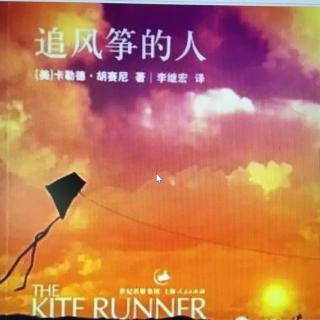
介绍:
The Kite Runner
怯懦往往让我们悔恨,对自己,对别人都不能负责任。但却逃不开自己的心。
你在追风筝,还是在追心,还是追着追着就忘了自己到底在追什么。你跑过父亲,跑过田野,跑过战争,跑过你挚爱的朋友,他因为内心塞满了恐惧甚至不敢回头看你一眼。 朋友,你是这世界上唯一一个不是因为害怕而奔跑的人。虽说不求回报,但我还是做了你的炮灰。
主人公阿米尔是个富家少爷,却存在着缺少父爱的迹象,一点点模糊父亲在他心目中的记忆,而他的随从同伴哈桑聪明却没有发展自我的机会,那种聪慧连主人都嫉妒的,并且拥有极度的忠诚,两个人终究会朝着什么方向发展......
阿富汗人总喜欢说,生活会继续,他们不关心开始或结束,成功或者失败,危在旦夕或者柳暗花明。只顾像游牧部落那样风尘仆仆地缓慢前进
CHAPTER TWO
When we were children, Hassan and I used to climb the poplar trees in the driveway of my father's house and annoy our neighbors by reflecting sunlight into their Homes with a shard of mirror. We would sit across from each other on a pair of high branches, our naked feet dangling, our trouser pockets filled with dried mulberries and walnuts. We took turns with the mirror as we ate mulberries, pelted each other with them, giggling, laughing; I can still see Hassan up on that tree, sunlight flickering through the leaves on his almost perfectly round face, a face like a Chinese doll chiseled from hardwood: his flat, broad nose and slanting, narrow eyes like bamboo leaves, eyes that looked, depending on the light, gold, green, even sapphire. I can still see his tiny low-set ears and that pointed stub of a chin, a meaty appendage that looked like it was added as a mere afterthought. And the cleft lip, just left of midline, where the Chinese doll maker's instrument may have slipped; or perhaps he had simply grown tired and careless.
Sometimes, up in those trees, I talked Hassan into firing walnuts with his slingshot at the neighbor's one-eyed German shepherd. Hassan never wanted to, but if I asked, "really"asked, he wouldn't deny me. Hassan never denied me anything. And he was deadly with his slingshot. Hassan's father, Ali, used to catch us and get mad, or as mad as someone as gentle as Ali could ever get. He would wag his finger and wave us down from the tree. He would take the mirror and tell us what his mother had told him, that the devil shone mirrors too, shone them to distract Muslims during prayer. "And he laughs while he does it,?he always added, scowling at his son.
"Yes, Father,"Hassan would mumble, looking down at his feet. But he never told on me. Never told that the mirror, like shooting walnuts at the neighbor's dog, was always my idea.
The poplar trees lined the redbrick driveway, which led to a pair of wrought-iron gates. They in turn opened into an extension of the driveway into my father's estate. The house sat on the left side of the brick path, the backyard at the end of it.
Everyone agreed that my father, my Baba, had built the most beautiful house in the Wazir Akbar Khan district, a new and affluent neighborhood in the northern part of Kabul. Some thought it was the prettiest house in all of Kabul. A broad entryway flanked by rosebushes led to the sprawling house of marble floors and wide windows. Intricate mosaic tiles, handpicked by Baba in Isfahan, covered the floors of the four bathrooms. Gold-stitched tapestries, which Baba had bought in Calcutta, lined the walls; a crystal chandelier hung from the vaulted ceiling.
译文:
小时候,爸爸的房子有条车道,边上种着白杨树,哈桑和我经常爬上去,用一块镜子的碎片把阳光反照进邻居家里,惹得他们很恼火。在那高高的枝桠上,我们相对而坐,没穿鞋子的脚丫晃来荡去,裤兜里满是桑椹干和胡桃。我们换着玩那破镜子,边吃桑椹干,边用它们扔对方,忽而吃吃逗乐,忽而开怀大笑。我依然能记得哈桑坐在树上的样子,阳光穿过叶子,照着他那浑圆的脸庞。他的脸很像木头刻成的中国娃娃,鼻子大而扁平,双眼眯斜如同竹叶,在不同光线下会显现出金色、绿色,甚至是宝石蓝。我依然能看到他长得较低的小耳朵,还有突出的下巴,肉乎乎的,看起来像是一团后来才加上去的附属物。他的嘴唇从中间裂开,这兴许是那个制作中国娃娃的工匠手中的工具不慎滑落,又或者只是由于他的疲倦和心不在焉。
有时在树上我还会怂恿哈桑,让他用弹弓将胡桃射向邻家那独眼的德国牧羊犬。哈桑从无此想法,但若是我要求他,真的要求他,他不会拒绝。哈桑从未拒绝我任何事情。弹弓在他手中可是致命的武器。哈桑的父亲阿里常常逮到我们,像他那样和蔼的人,也被我们气得要疯了。他会张开手指,将我们从树上摇下来。他会将镜子拿走,并告诉我们,他的妈妈说魔鬼也用镜子,用它们照那些穆斯林信徒,让他们分心。“他这么做的时候会哈哈大笑。”他总是加上这么一句,并对他的儿子怒目相向。
“是的,爸爸。”哈桑会咕哝着,低头看自己的双脚。但他从不告发我,从来不提镜子、用胡桃射狗其实都是我的鬼主意。
那条通向两扇锻铁大门的红砖车道两旁植满白杨。车道延伸进敞开的双扉,再进去就是我父亲的地盘了。砖路的左边是房子,尽头则是后院。
人人都说我父亲的房子是瓦兹尔·阿克巴·汗区最华丽的屋宇,甚至有人认为它是全喀布尔最美观的建筑。它坐落于喀布尔北部繁华的新兴城区,入口通道甚为宽广,两旁种着蔷薇;房子开间不少,铺着大理石地板,还有很大的窗户。爸爸亲手在伊斯法罕(Isfaham,伊朗中部城市)选购了精美的马赛克瓷砖,铺满四个浴室的地面,还从加尔各答(Calcutta,印度城市)买来金丝织成的挂毯,用于装饰墙壁,拱形的天花板上挂着水晶吊灯。
大家还在听

